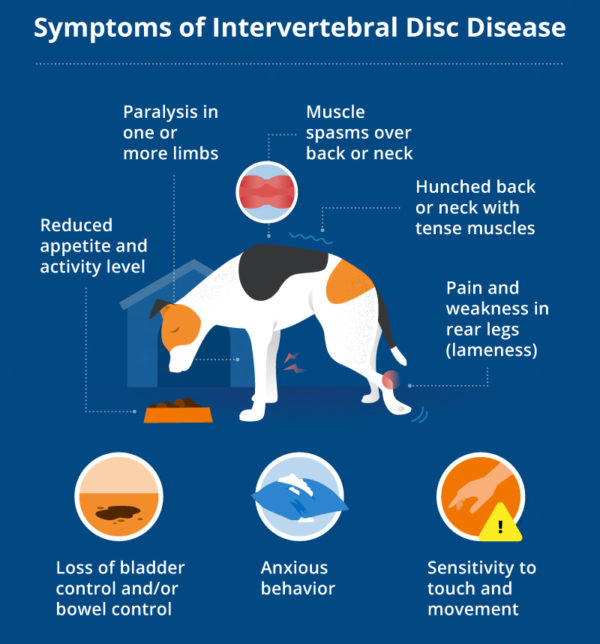|
Alrighty- let’s talk intervertebral disc disease in dogs and cats. What a mouthful… this is also known as IVDD. When a pet has IVDD the disc (soft squishy cushion) that sits between the vertebrae (bones that protect the spinal cord) either bulges or bursts. When the disc herniates, it puts pressure on the nerves which can cause pain, nerve damage, and even paralysis. This is similar to when humans have a disc bulge or hernia in their back. Some of the symptoms of a dog or cat with IVDD include hesitancy or inability to jump (on the couch, bed, or even obstacles in agility training), pain/ weakness in the rear legs, crying in pain, anxious behavior, muscle spasms, reduced appetite, or even loss of bladder/ bowel control.
How is intervertebral disc disease (IVDD) diagnosed in dogs or cats? Certified chiropractors and/or veterinarians start by completing a neurologic exam which helps figure out what area of the spine is being affected. From there, x-rays can help determine if there is anything abnormal going on with the physical vertebrae of the spine. An x-ray can also show if the space between the vertebrae is smaller or shows signs of degeneration which would be an indicator that that area may be where the disc bulge is occurring. Based on that information, a certified chiropractor can actually check to see if there is restricted movement in that segment using motion palpation. If there is restricted movement, a gentle chiropractic adjustment can actually help to restore motion, take pressure off of the nerve, and allow fluid to get into that area to promote healing which oftentimes leads to a lessening in the severity of the symptoms. Along with chiropractic care, veterinarians may also recommend anti-inflammatory medication, muscle relaxers, and crate rest. After a couple of chiropractic adjustments the dog or cat may show signs that conservative care has been helpful. If the animal is able to walk better and wants to play more, if the muscle spasms improve and their appetite improves this would all be good indicators that conservative care was beneficial. If the dog or cat does not improve, more testing may be necessary starting with either a myelogram or MRI. Based on the severity of what the testing shows, surgery may be needed to open up the space by removing part of the vertebrae or disc which would take pressure off of the nerves. Surgery is for worst case scenarios. There are different stages of disc degeneration which is listed below:
1 Comment
|
AuthorsDr. Doug and Jeanette love teaching people about health and wellness. If we haven't covered a topic that you're interested in, feel free to leave a comment and we'd be happy to give you our thoughts! Archives
September 2022
Categories |


 RSS Feed
RSS Feed